With the new year, we introduce new OmniChat features. OmniChat for Jira Service Management as cross-channel support for customers enables easy two-way communication via WhatsApp and SMS. Our customers come from different industries, from finance to transport, so we try to listen as much as possible and improve OmniChat based on their experiences.
Customer profile
With the new OmniChat version, project administrators and agents can both edit and create customer profiles.
A customer is a person who makes a request from your service project. To create a Jira Service Management customer, only a customer email is required. However, to create an OmniChat customer, you need some additional information:
To provide all the relevant information for agents, we added an overview of all created issues with their status. (Jira Service Management converts customer requests into issues for agents to work on.) This provides a complete customer profile in the Issues view with display name, customer note and a list of issues created.
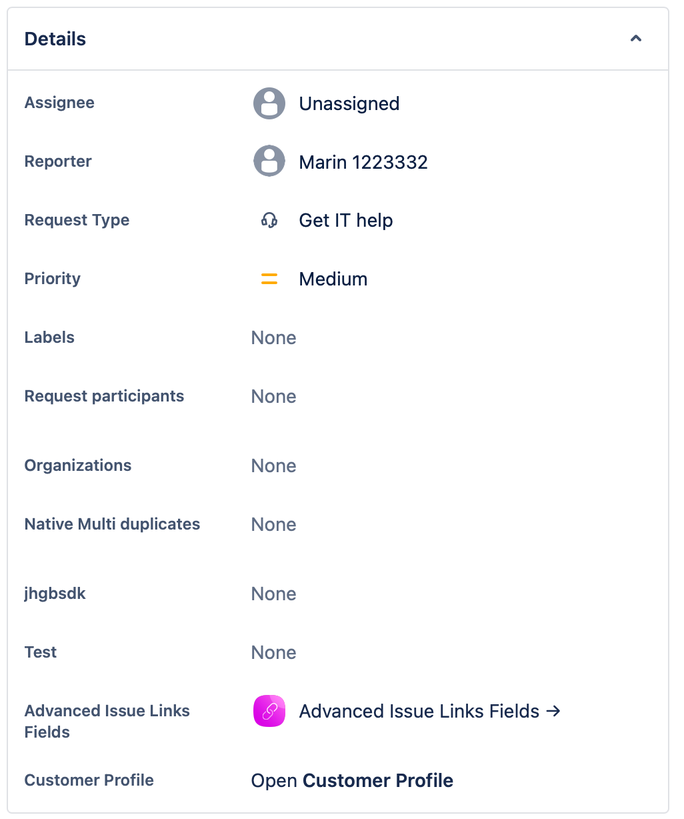
What we had before was numbers saved as customers, while with the new app version, agents have an option to change that number with a name.
Also new in the profile is a customer note. Agents can make internal comments or notes about the customer of up to 255 characters.
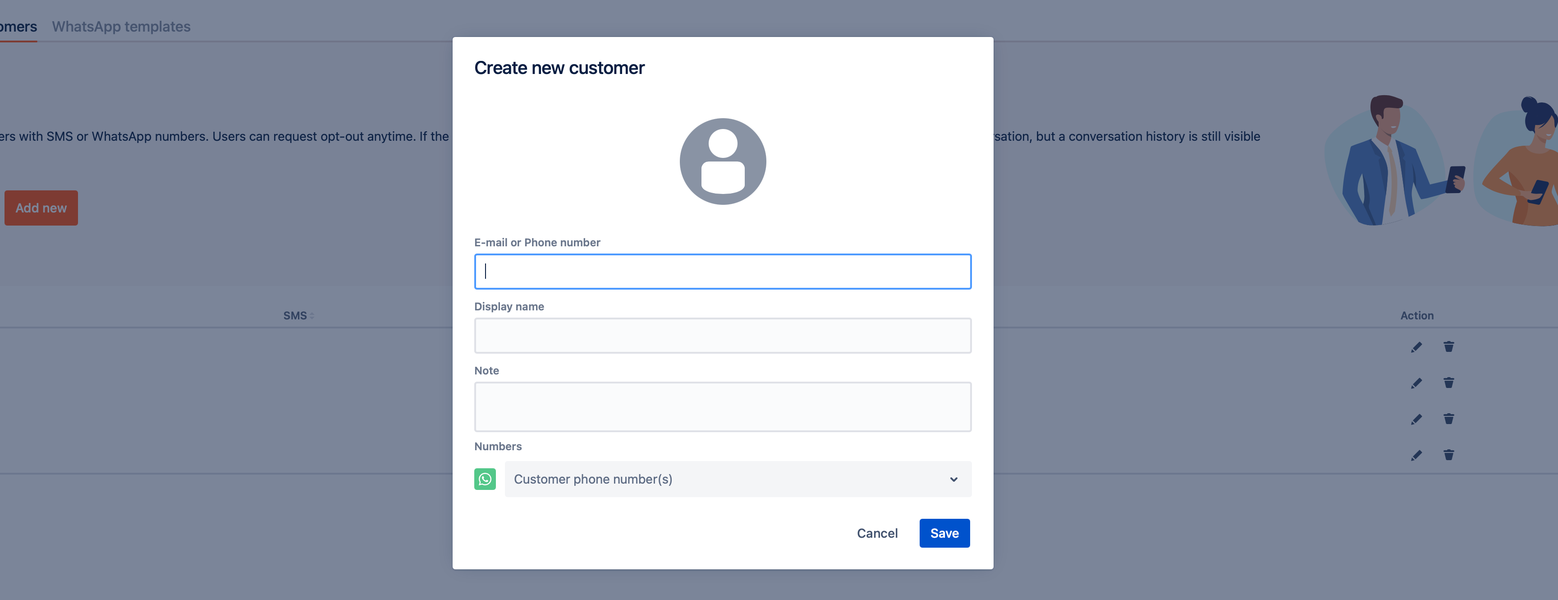
Video
Showing it is much easier than explaining it. We already had the option to share pictures to speed up conversations and improve resolution time. With the new OmniChat for JSM version, both customers and agents can send videos of up to 15 MB to explain and solve the problem faster.
Ready to integrate texting into your customer-to-business communication and take your customer support to another level? OmniChat for Jira Service Management will help you build more personalized communication with real-time messages.
Visit our website omnichat.cloud to book a demo and discover more details and guides or try it right on Atlassian Marketplace.
With numerous chatting apps reaching their milestones and billions daily, and even more of them arising every day, some might not see OmniChat capability. Especially with having powerful collaboration platforms such as Slack and Teams taking almost every potential user worldwide.
To show you that OmniChat is not another chatting app trying to get famous fast, and, to be precise, it’s not a chat app at all; we are comparing it to everyone well known Slack.
Still, this is not an article about which product is better, yet about how both OmniChat and Slack can be connected to Jira, have different advantages, and still be used together.
Slack is presented as “a new way to communicate - faster than email and more focused than chat”. As a channel-based messaging platform, Slack enables direct and group messaging as well as file sharing. By sharing a channel in Slack, you can keep clients, vendors or partners in the loop.
Launched back in 2014, Slack now has 12 million active users daily. A substantial change for Slack was back in 2018 when Atlassian and Slack joined forces. As pointed out in TechCrunch last August: “Over the course of the last two years, Slack and Atlassian shipped 11 product integrations, which now see about a million active users every month, with Jira being the most often used integration”.
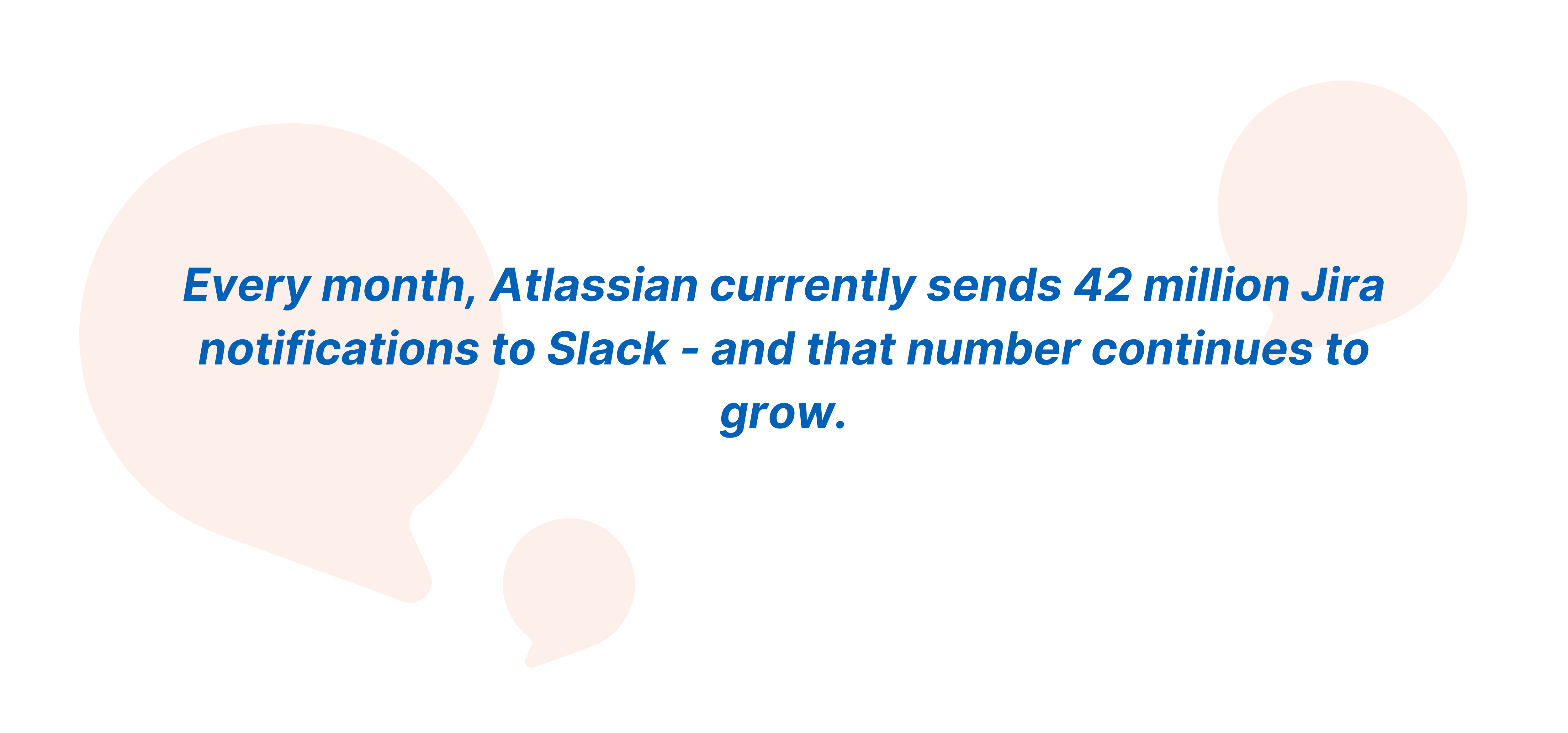
You can read more about Atlassian and Slack partnership here.
Most business tools, like Jira, Halp, Zapier and Google Drive, are integrated into Slack. There are over 2,000 apps and 750 bots on the Slack App Directory.
So, the question pops out again: why would you use OmniChat when Slack has all of this? To answer that question, let us explain what OmniChat does.
OmniChat for Jira Service Management is cross-channel support for customers that enables two-way communication via WhatsApp and SMS. It gives customers an option to choose a chat app, making the communication easy for them, while it stays the same, on a single interface for agents.
Communication from Jira Service Management to customers and vice versa is done via OmniChat through any channel.
Although most companies have rules for communicating with users only via email or Teams, the integration of OmniChat gives users freedom of choice.
While Slack improves internal communication between teams and individuals, OmniChat goes beyond the building and strengthens communication between customers/clients and companies.
As Jonathan Ryan, Infobip’s regional manager, said: “Slack is a very good tool, but has a very specific kind of audience, look, feel, and interaction capability with it. It doesn’t reach everybody the same way as an SMS or WhatsApp message.”
In the end, it’s about what your customers want, not you. According to Incite Group, over 50% of companies report their most critical customer experience issue as being “providing a seamless experience across multiple channels.”
Ryan added that an issue with using an over the top messaging service is that you can have failover. "If you initiated a conversation originally via WhatsApp flow and there is a, for some reason, degradation in service due to the loss of data capability or issue with the service due to the network, you still can deliver an SMS message.”
To conclude…
Slack is an excellent channel for your company communication. It is faster and more organized than email, keeps everyone in the loop and on the whole team same page. Slack definitely helps you get work done. Internally.
OmniChat, on the other hand, connects communication channels with JSM and customers with companies. OmniChat simplifies work. Externally.
At Atlassian Community Event Sydney, we discussed integrating popular chat apps with Jira Service Management. If you want to know more about OmniChat’s advantage over Slack, watch the webinar on the video below.
Ready to integrate texting into your customer-to-business communication and take your customer support to another level? OmniChat for Jira Service Management will help you build more personalized communication with real-time messages.
Visit our website omnichat.cloud to book a demo and discover more details and guides.
Two, at first, almost identical, types of communication between companies and customers with multiple channels have one significant difference - integration.
What once was a simple, straightforward B2C communication, with the rise of the digital world and all its assets, got a bit complicated. That business to customer relationship shifted from a simple process of supply and demand to the creation of emotional connection and brand loyalty.
What makes the difference is the answer to the question - how do they manage the channels. Is there a smooth integration between all the channels or is every channel managed on its own?
It all comes to a single goal - better customer experience, something that is impossible to get if the customer journey isn’t perfectly connected with company services.
Omnichannel communication is manifested through multiple channels, in a seamless process for the customer. It is a consistent customer experience through the whole customer lifecycle - from initial pre-sales contact to post-sales relationship nurture.
With this type of communication, companies build a standard approach. “The messaging, advertising methods and purchasing experience will also be the same because the omnichannel approach creates a cohesive, unified experience.”
No customer has the same journey or the same initial approach to a company or a product. Some may go straight to customer service, some try to contact a company on Facebook, and some might look for the information on the website.
The other side, the company, needs to be ready to answer that inquiry at any step of the process.
Infobip, a global leader in omnichannel communication, points out three main benefits of holistic omnichannel experience: engagement, satisfaction, and optimization.
1. Maximize customer engagement
The better a company knows their customers, the better it can answer their needs. All the channels running are not just for one way communication. Using its full potential, a company can adapt its approach to each customer. Not only to sell a product but also to get to know customers.
Creating customer profiles, gathering information about their desires, wishes, habits, and pet peeves; helps companies build and grow a strong customer engagement.
2. Improve customer satisfaction
Satisfaction comes from fast and efficient problem-solving results. Having a plethora of channels makes the company approachable, but having bad or no connection between them, makes the company unreliable.
Let's say that a customer contacted you via customer support about an issue he is having. Your reply and fix it. In about a week, a customer has the same issue and contacts you on Facebook. He expects you already to know what he is talking about, regardless of how he reached out to you and who is behind the company profiles. If you don't, that is a bad CX.
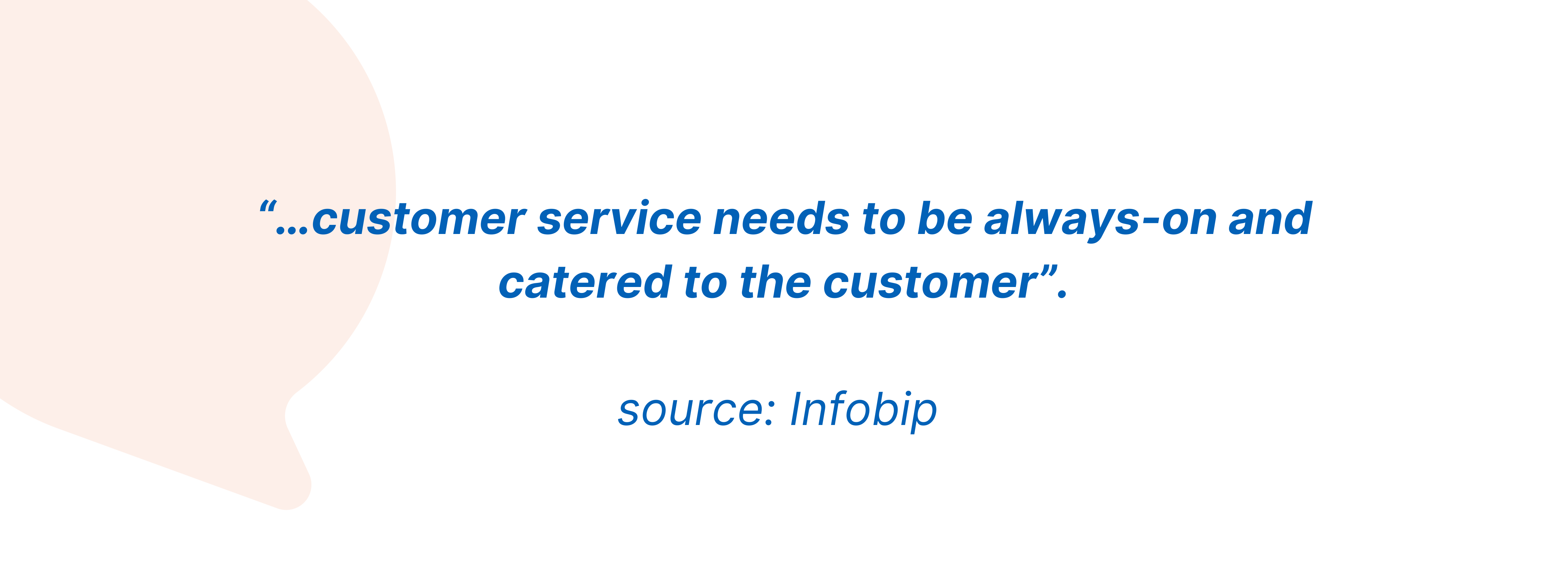
3. Optimize internal processes
To make everything run smoothly on the company side and save time both for customers and companies, chatbot comes as an easy and cost-efficient option.
To learn more about what benefits chatbots bring to your business, check this article.
If your company is using Atlassian products, check OmniChat for Jira Service Management. It is a cross-channel support for customers, on a single interface for agents.
Multichannel communication focuses on each of the channels individually and builds a strategy for them separately. Whether that be print, SMS or a chat app of the same company, it has its own approach.
Multichannel communication serves customers where they are, creating strong relationships around a single channel.
As defined by Emrasys: “Multichannel marketing is the implementation of a single strategy across multiple channels or platforms, thus maximizing opportunities to interact with prospective customers. A channel might be email, a print ad, a retail location, a website, a promotional event, a mobile app, SMS messaging, a product’s package, or word-of-mouth.”
1. More data
Companies can leverage the bond that customers have with one of the channels by gathering more information about them and creating more personalized relationships. Communicating with the same group of customers on a single channel allows a company the opportunity to get to know them better, to be more familiar with their preferences and habits.
2. Better reach
Implementing a multichannel communication strategy increases the possibility of higher visibility, bigger customer reach, and, in the end, the potential for revenue generation. Just like omnichannel, multichannel communication also gives power to the customer. It gives them the option to choose a channel they preferer, how, when and where they will interact with a company.
Creating multiple sources of information makes it almost impossible for a customer not to notice you.
3. Consistency
Focusing on each channel separately, companies can build consistent communication with customers. Content is created around it and formatted to target a group that uses mainly that communication channel.
The customer knows what to expect from the company. He is used to their communication style, frequency and overall experience. The problem comes when a customer wants to switch to a different communication channel.
It is common and, lately, necessary for companies to have both online and offline presence. One part of them manages them individually. That is multichannel communication.
The other part creates a seamless brand voice for all the channels. That is omnichannel communication.
Working on a strategy based on every channel on its own has many advantages. You can use their maximum potential, play with monetization tricks and algorithms, researches. During that time, a company can create an in-depth customer profile to target each group differently. The way omnichannel steps in is by connecting all those information and making a unified communication process.
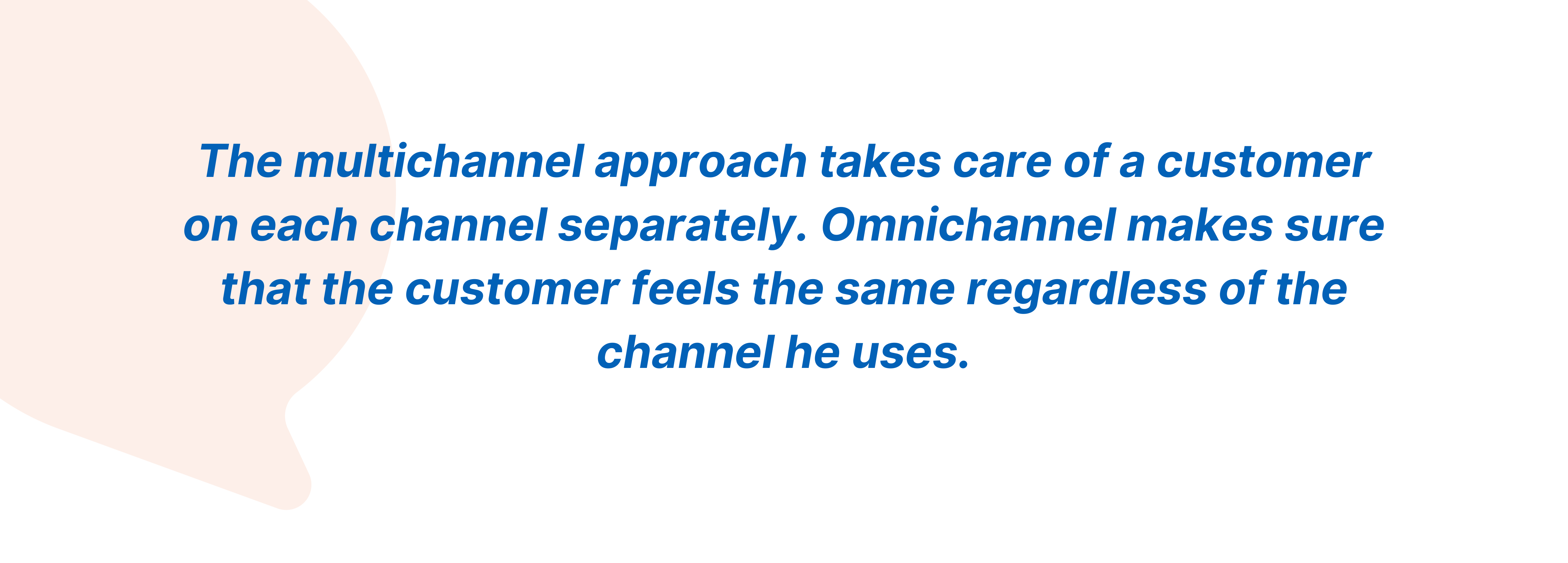
The process of developing from a “just-looking” person to a loyal customer takes time; that is why it is essential to pay attention to every step of that journey. If a customer jumps from email to WhatsApp and, in the end, a physical store, multichannel communication will lose him, while omnichannel will protect the customer.
Whether we talk about retail, marketing, eCommerce or any other field, the omnichannel approach puts customers at the centre.
A business strategy will be successful if it meets customers at multiple touchpoints across their journey, where the customer initiates and still makes it look and feel seamless. In the end, the best multichannel communication is omnichannel communication.
By adapting their cloud communications platform to meet ever-changing consumer preferences, technologies, and compliance requirements in 200-plus countries, Infobip has reached over five billion people and the ultra-rare “unicorn valuation” of $1 billion.
Accommodating so many variations and keeping up with such exponential growth would be enough to make most teams dizzy. But with Atlassian Data Center and more modern DevOps and ITSM practices, Infobip has steadily increased deployment velocity, decreased resolution times from days to minutes, and helped two-thirds of the world’s population communicate with confidence...
Atlassian powers teamwork at 180,000+ companies worldwide. Through this type of content, they share inspiring stories from their customers around the globe. Check more customer stories from Atlassian on www.atlassian.com/customers.
We combined forces with Infobip to help facilitate Atlassian and forward-thinking businesses to build sophisticated and connected customer experiences across every single stage of the customer journey. Together we plan to transform digital processes according to customers' needs and wants.
This Croatian company, with more than 60 offices on six continents, builds meaningful customer relationships over any channel with its full-stack cloud communication platform.
Their popularity grew rapidly since July 2020, when they raised $200m from One Equity Partners and got unicorn status.
As explained in their Atlassian Success Story, the platform powers messaging for over 750 banks and some of the world’s leading bluechip enterprises, social networks, tech companies, and aggregators. Infobip’s customer portfolio features some of the biggest names across all industries, from LG, Burger King, and Uber, to Snapchat, Raiffeisen Bank, and Facebook, as well as some of the most-used communication systems in the world, such as WhatsApp and Viber.
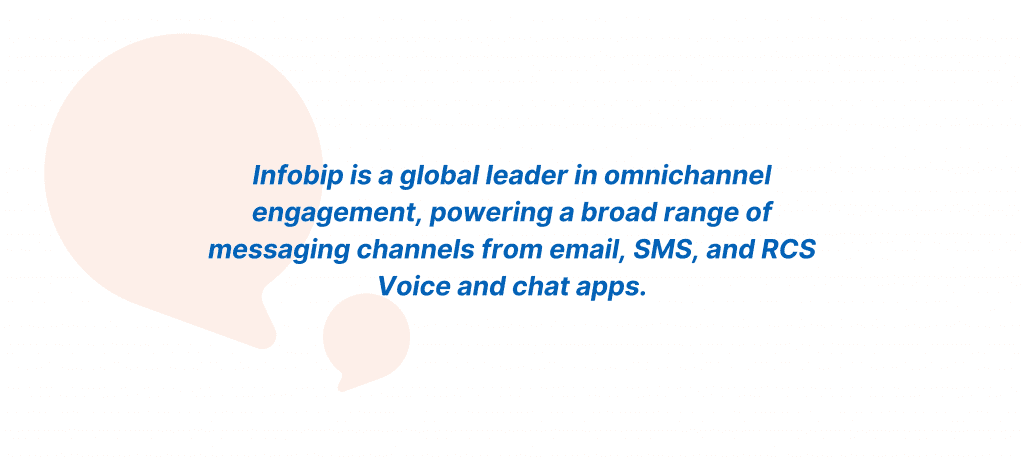
To understand who Infobip is, let us first get to the omnichannel definition. Omnichannel stands for synchronized and unified communication over multiple channels, such as SMS, Chat Apps, email, Voice, and more. It reaches customers on their preferred channels, how and when they want to hear from you.
While some of your elderly are still taken aback by a company asking for their number, not mentioning if they actually call them, it wasn’t that long ago when the majority of people were suspicious of a brand asking for their email. Yet, now we are so used to being contacted by businesses in countless ways, that we even find it problematic if they don’t do it.
As Infobip’s research shows, 70% of customers say that connected processes are very important for winning their business. So to increase customer lifetime value, it is necessary to engage with them through the whole journey, especially by conversational messaging after the purchase.
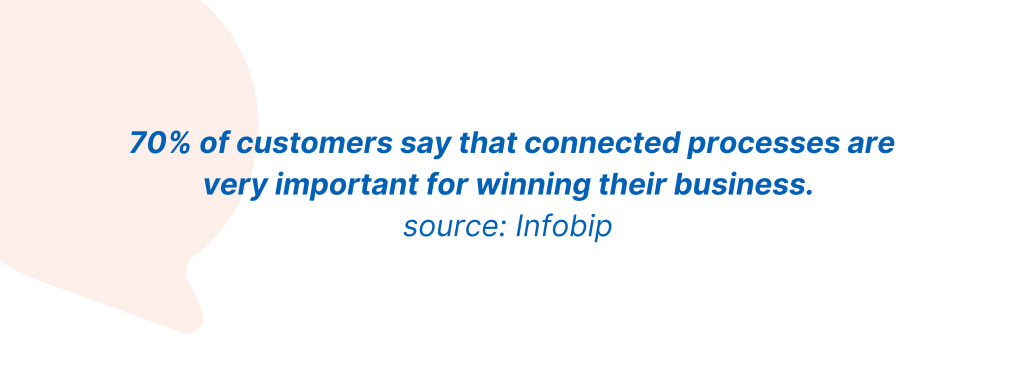
Looks like we have come a long way.
According to the numbers below (source: Customer think), customers expect companies to provide communication on:
The rise of technology has shifted the ways we communicate with each other and as well as how businesses communicate with their customers. Just have in mind that WhatsApp Business didn’t exist three years ago, and now has over 1.5 billion users. Add to it all the other Chat Apps such as Viber, Telegram, Messenger, and you have a pretty massive reach. Still, SMS is one of the most effective ways to communicate due to its high open rate and the “small” fact that with it you can reach every person in the world that has a phone.
As we saw above, 86% of respondents still trust and want to engage with businesses over email. As a channel that offers a lot of space for customization and personalization to create deep business-to-customer relationships, email had an impressive 23% growth rate in the last five years.
As we witness the ongoing change in communication, strategies that businesses used years before, don’t work anymore. Take into consideration different types of people also - calling a Millennial won’t be as successful as calling a Baby Boomer. And with the speed the things are evolving, what works now, probably won’t be accurate in the future.
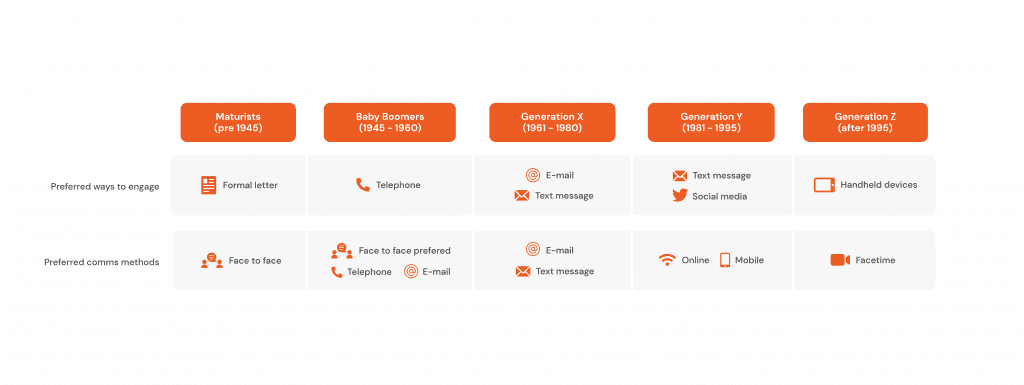
Communication preferences by generations
Accessed through a single platform, Infobip’s omnichannel engagement, identity, user authentication, security, and contact centre solutions help clients and partners overcome the complexity of consumer communications, grow their business, and increase loyalty– all in a fast, secure, and reliable way. Bringing multiple channels together, Infobip gives customers the power to define the communication, still making it easy and simple for businesses.
As Infobip’s CEO Silvio Kutić said to Bloomberg: “We are trying to go deeper into technology, to include more artificial intelligence through all our solutions. The aim is always to give people more time for various tasks and make their lives better.
For businesses that rely on customer support as a vital part of customers' journey and their relationship, any limitations can have a big impact on customers' overall satisfaction and retention rate.
With OmniChat for Jira Service Management, a customer has the ability to choose a communication channel, while the agents have a seamless single interface experience.
As an Atlassian Platinum Solution Partner, we at Evolutio saw an opportunity to take the communication between agents and end-users on Jira Service Management to another level. In partnership with Infobip, we created OmniChat for JSM - a cross channel support for customers, that enables easy two-way communication via WhatsApp and SMS.
Ready to integrate texting into your customer-to-business communication and take your customer support to another level? OmniChat for Jira Service Management will help you build more personalized communication with real-time messages.
Visit our website omnichat.cloud to book a demo and discover more details and guides.
Customers are seeking the simplicity of the purchasing experience more than the price and even the quality of a product. Creating a customer experience via different channels results in a consistent conversation and, in the end, a purchase.
The omnichannel approach to communication has a crucial impact on evolving business-to-consumer relationships. Today, it is all about reaching consumers on their preferred channels, how and when they want to. And if there is anything we learned in unforgettable 2020, it is that digital communication is vital for every business.
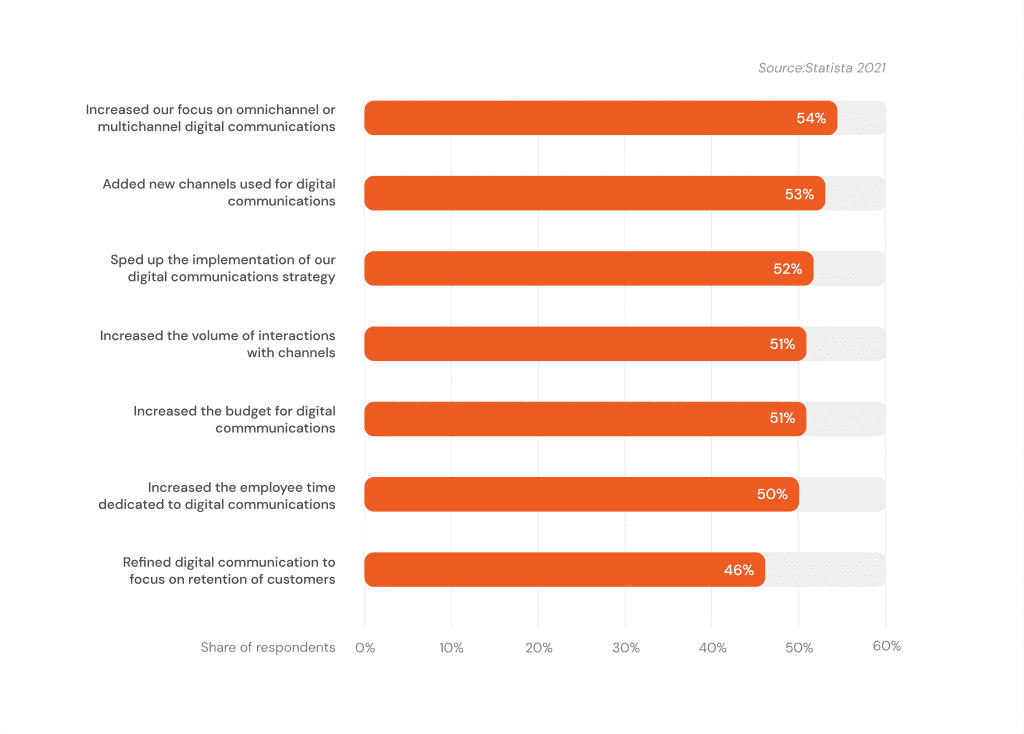
How organizations have adapted their digital communication strategy in response to the 2020 Covid-19 crisis. Source: Statista
As research shows (source: Infobip), 70% of consumers say that connected processes are very important for winning their business. The huge shift is not in the way of communication, but in the channels used for it, is undeniable.
Atlassian Jira Service Management “brings IT operations and development teams together to collaborate at high velocity and power digital enterprises”, but it has a common issue - limited communication to their end-users, only through help desk and support. By integrating Omnichat, an omnichannel solution for JSM, a new avenue for communication opens on channels with high engagement and open rate.
In this article, we will cover why omnichannel strategy is important for customer engagement and show you how OmniChat for Jira Service Management can help you connect with customers on a more personal level.
OmniChat for Jira Service Management is cross-channel support for customers, on a single interface for agents. It enables easy two-way communication via WhatsApp and SMS and helps in building a meaningful customer relationship.
With the OmniChat plugin, you can:
· Raise requests and send feedback via WhatsApp and SMS.
· Build more personalized communication with real-time messages.
· Add a phone number for existing JSM Customers and switch to omnichannel communication.
· Exchange images and files with customers to improve resolution time.
· Use WhatsApp templates for secure communication.
· Configure a custom project and request type for each number.
Instead of creating a request on Jira Service Management, you can just send a message that the support agents will see in the description field of the ticket. You can send a text via SMS or even images via WhatsApp and the agents will reply to you. You can check a detailed user guide here.
Between catching customers from the real to digital world and backward, and providing them with all the information they need, businesses struggle to create a communication strategy that will secure sales and build brand loyalty.
With OmniChat, you can engage your customers in real-time and answer their questions, resolve potential issues, and learn more about your customers' expectations in a relevant, timely, and personal way.
How many times did you say, “Just send it on my WhatsApp?” It is easy, convenient, efficient. WhatsApp is used in over 180 countries, with the highest number of users in India, Africa, and South America.
Launched in 2018. for only five markets initially, WhatsApp Business now has 1.5 billion users worldwide. It has opened up a whole new digital dimension for customer-to-business communication. Customers have an opportunity to message you directly through their entire journey - from first verification to notifications and any kind of purchase assistance. While support agents usually have writing skills, nothing beats showing the customer what to do. Improve your resolution time with the world’s most used chat app.
Let us not forget the good old SMS. You may not give it too much recognition, but there are almost 5 billion SMS users globally - with a 6-second speed rate on average and an average reply within 90 seconds of receipt.
Due to the fact that it doesn’t rely on an internet connection, SMS is one of the most dependable messaging platforms. As the only real-time communication method available on every mobile phone in the world, it has the power to bridge the gap between the developed world and the part that is still developing.
52% of surveyed consumers said they would prefer texting to customer support than the current method of communication (and that per cent is even bigger when talking about Millennials).
And when you put just those two communication channels together, you get 90% of messages read within a few minutes of receipt.
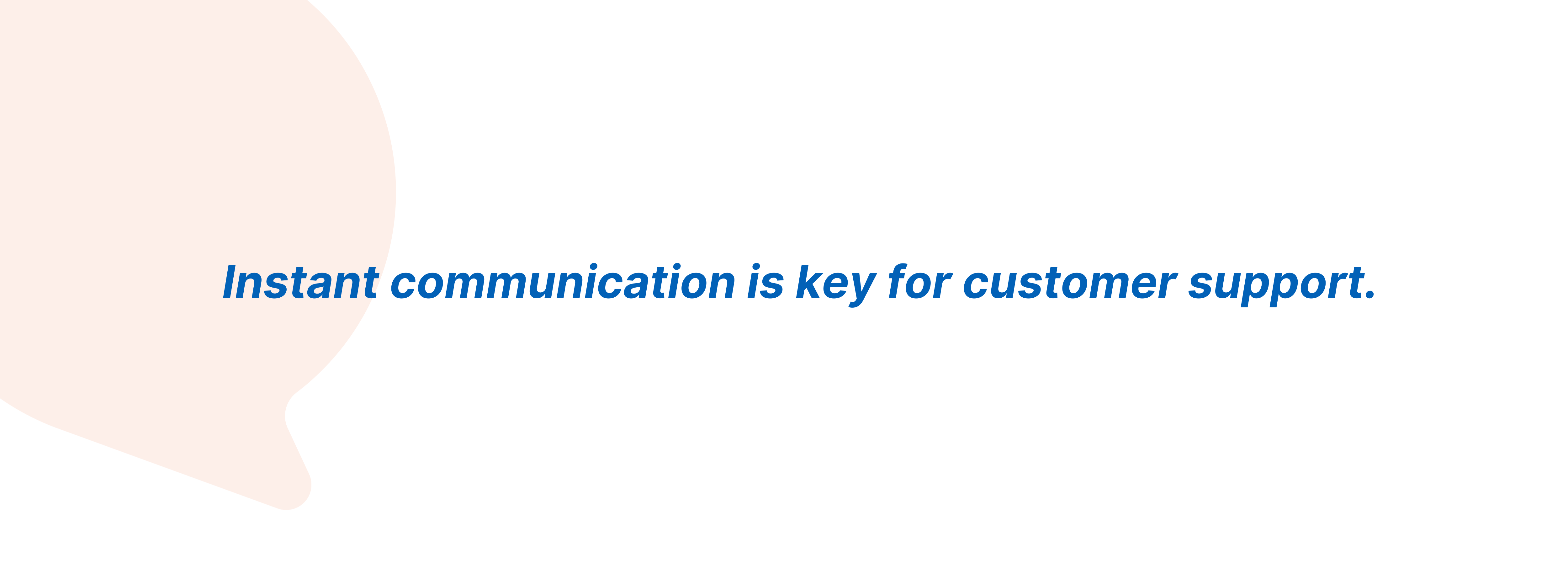
Customer engagement starts with a personalized conversation. With over 5 billion people sending and receiving SMS messages and 2 billion WhatsApp users, omnichannel support is a must today. Engage with customers on their preferred communication channels by enhancing the customer experience through personalized and contextual communication with WhatsApp and SMS at every touchpoint of the customer journey.
1. Retention ⎯ OmniChat for Jira Service Management increases your customer retention and loyalty by building one on one relationships with customers via cross-channel support.
2. Operational efficiency ⎯ A single agent interface allows you to communicate effectively with your customer over multiple channels.
3. Lead generation ⎯ Generate and nurture leads with targeted, multi-channel campaigns and personalized customer journey.
By allowing customers to choose the channel they prefer, you are enabling them to customize the conversation according to their needs. The additional advantage of OmniChat is that customer flexibility does not harm support agents' work. For agents, all information is at the same place in Jira Service Management.
Ready to integrate texting into your customer-to-business communication and take your customer support to another level? OmniChat for Jira Service Management will help you build more personalized communication with real-time messages.
Visit our website omnichat.cloud to book a demo and discover more details and guides.